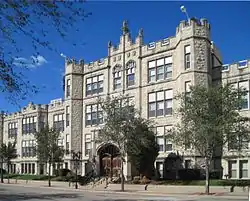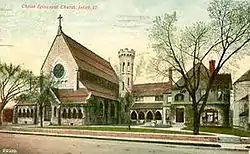Frank Shaver Allen | |
|---|---|
 F. S. Allen, 1895 | |
| Born | 1860 |
| Died | August 26, 1930 |
| Nationality | American |
| Occupation | Architect |

Frank Shaver Allen (1860–1930), usually known as F. S. Allen was a significant Joliet, Illinois-based American architect noted for his Richardsonian Romanesque school designs.
Early life and career
Frank Shaver Allen was born in 1860 in Galesburg, Illinois, to Sheldon W. and Nancy A. (Shaver) Allen.[1] He seems to have received some training in Chicago.[2] By 1880, he was practicing architecture in Streator, Illinois. In 1886, Allen formed a partnership with John H. Coxhead, the firm being Allen & Coxhead.[3] The partnership was dissolved the following year when Coxhead relocated to St. Paul, Minnesota.[4] Following the dissolution of this partnership Allen moved to Joliet, where he did much of his best-known work.
In 1893, an exhibit of his work in school architecture at the World's Columbian Exposition received an award from the exposition commission, which led to significant expansion of his practice.[5]
After being commissioned for work in California, he moved to Los Angeles in 1904 with his family, settling in Pasadena.[6] He originally maintained his practice from Pasadena, but moved it to Los Angeles in 1907.
Allen was also an Egyptologist.
Alleged kidnapping incident, retirement and death
Allen was arrested for having an Altadena boy in his Los Angeles hotel room. The Los Angeles Times wrote that: "The boy, in whose company he was when arrested, is the same who was reported missing some time ago. No trace of him could be found by the police until he walked into his home in Altadena with the explanation that he had been in San Francisco with Allen. The matter was reported to the District Attorney's office, and an investigation was begun which resulted in last night's arrests. Allen is one of the most prominent architects in Southern California. He has been reckoned as a leader in his profession in this end of the State, and has occupied a high position in society. His family is of the most exclusive in the fashionable circles of Pasadena and Altadena."[7][8] By early the next year, the felony charge was dropped. The Los Angeles Times reported that "The felony charge against F. S. Allen, a Pasadena architect, was ordered dismissed on motion of Deputy District Attorney Harry Alexander, on the ground it would be impossible to secure sufficient evidence to convict Allen."[9]
Though other details of this incident are not known, it likely hastened the end of Allen's architectural career, who retired in 1915.[2] He later operated a music store. He died in California on August 26, 1930.[1][10]
Legacy
Allen was responsible for a number of buildings that have been listed on the United States National Register of Historic Places.
Architectural works
| Year | Building | Address | City | State | Notes | Image | Reference |
|---|---|---|---|---|---|---|---|
| 1885 | Christ Episcopal Church | 75 W Van Buren St | Joliet | Illinois | Listed on the National Register of Historic Places in 1982, but destroyed by fire in 2006. |  | [2] |
| 1890 | Kenosha High School (former) | 913 57th St | Kenosha | Wisconsin | Demolished. | [11] | |
| 1892 | Sioux City Central High School (former) | 610 13th St | Sioux City | Iowa | Listed on the National Register of Historic Places in 1974. |  | [12] |
| 1895 | East St. Louis High School (former) | 501 N 10th St | East St. Louis | Illinois | Demolished. |  | [13] |
| 1895 | Washington School | 818 W Lorain St | Appleton | Wisconsin | Listed on the National Register of Historic Places in 1984. |  | [14] |
| 1898 | Trenton High School | Chestnut and Hamilton Aves | Trenton | New Jersey | Demolished. | [5] | |
| 1901 | Joliet Township High School | 201 E Jefferson St | Joliet | Illinois | Listed on the National Register of Historic Places in 1982. |  | [15] |
| 1906 | San Diego High School | 1405 Park Blvd | San Diego | California | Demolished in 1975. | [16] | |
| 1907 | San Jose High School | E San Fernando and S 7th St | San Jose | California | Demolished. | [17][18] | |
External links
References
- 1 2 "Frank Shaver Allen", https://www.findagrave.com, Find A Grave, January 28, 2013.
- 1 2 3 Christ Episcopal Church NRHP Registration Form (1982)
- ↑ "New Architectural Firms," Inland Architect and Builder 7, no. 1 (February 1886): 8.
- ↑ Jeffrey A. Hess and Paul Clifford Larson, St. Paul's Architecture: A History (Minneapolis: University of Minnesota Press, 2006): 72-74.
- 1 2 "Architect Allen's Advance," School Board Journal 16, no. 3 (March 1898): 11.
- ↑ "Hotel Arrivals," Los Angeles Herald, February 25, 1904, 2.
- ↑ "Architect Is Under Arrest," Los Angeles Times, 09/01/1910, pt. II, p. 3.
- ↑ "Architect Under Arrest," Los Angeles Times, September 1, 1910, 14.
- ↑ "Wants Probation," Los Angeles Times, 02/22/1911, pt. II, p. 2.
- ↑ Frank Shaver Allen, Pacific Coast Architecture Database. Accessed October 27, 2022.
- ↑ Frank H. Lyman, The City of Kenosha and Kenosha County, Wisconsin: A Record of Settlement, Organization, Progress and Achievement (Chicago: S. J. Clarke Publishing Company, 1916)
- ↑ Sioux City Central High School NRHP Registration Form (1974)
- ↑ "New High School Building," American School Board Journal 11, no. 6 (December 1895): n.p.
- ↑ Washington School NRHP Registration Form (1984)
- ↑ Joliet Township High School NRHP Registration Form (1982)
- ↑ American Architect and Building News 89, no. 1587 (May 26, 1906): xv.
- ↑ Architect and Engineer of California 8, no. 3 (April 1907): 89.
- ↑ F. S. Allen, "The San Jose High School," Architect and Engineer of California 16, no. 2 (March 1909): 35-44.